 SACDA News2024
SACDA News2024
A systemic approach to career development will empower citizens to build strong foundations on which to construct their careers.
CAREER DEVELOPMENT FROM EARLY CHILDHOOD
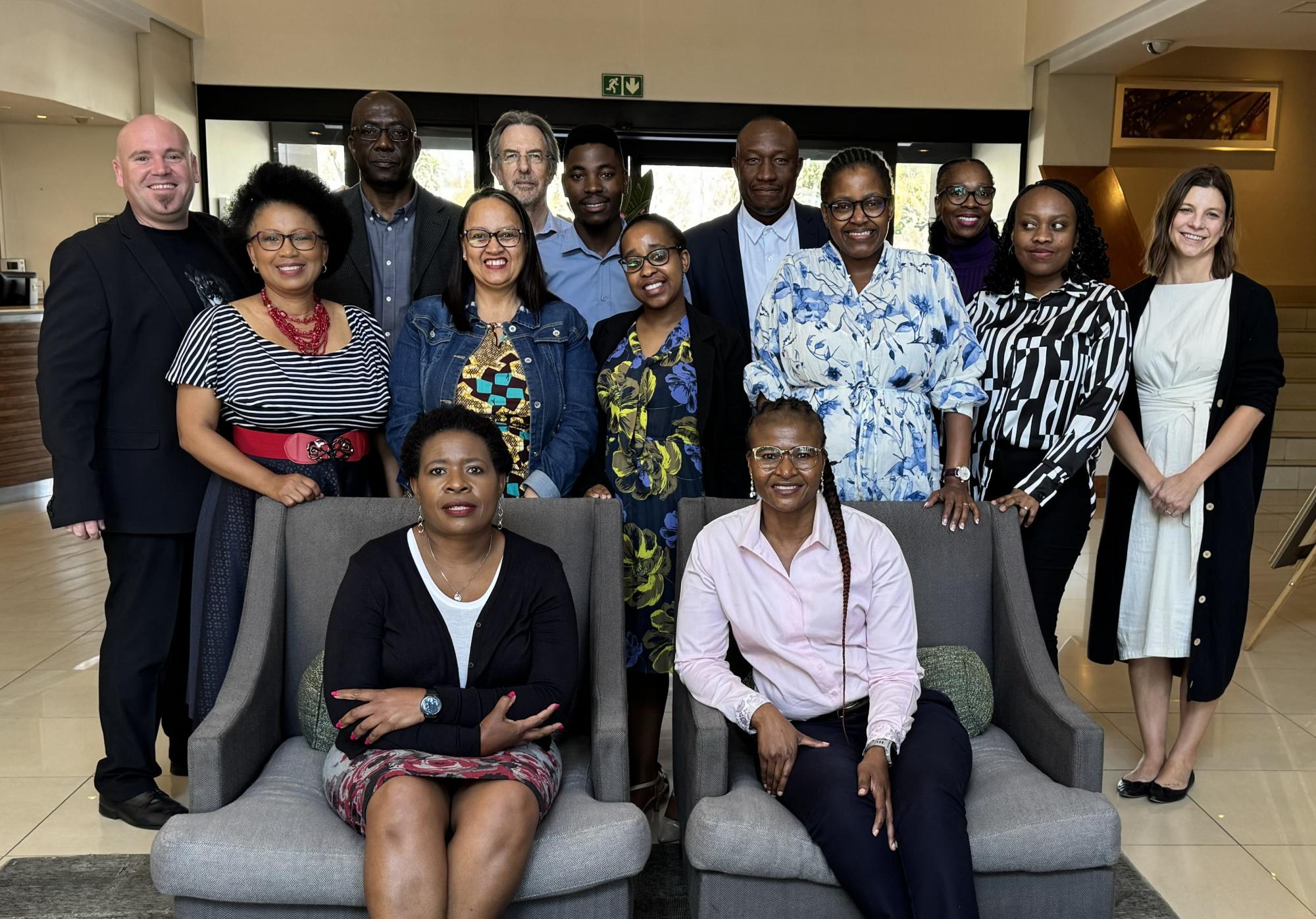
Sustainable livelihoods has been included as a cross-cutting priority in curriculum strengthening to include career development and entrepreneurship. Career development will therefore be infused into all subjects further to life skills and life orientation. An audit of the CAPS curriculum is underway to determine how sustainable livelihoods is currently positioned in all subjects to determine the gaps and opportunities for integration. Space for structured experiential activities for sustainable livelihoods is also needed to ensure learners are better prepared for post-school education and training, and work.
To this end, 1-day dedicated to the National Careers Week (NCW) has been recommended for inclusion in the curriculum in term 3, week 8 each year from early childhood development. The NCW is a programme of the Department of Basic Education (DBE), Department of Higher Education and Training (DHET), Department of Employment and Labour (DEL), Department of Small Business Development (DSBD) and SACDA.
Through the Education for Employability (E4E) programme, the proposal for the NCW was consulted with 376 national, provincial and district education officials between March and July 2024 with full support being confirmed. The proposal was presented to the Curriculum Working Group in May, June and October 2024 with agreement in principle for inclusion into the CAPS curriculum.
Guidelines to assist schools in the implementation of the NCW will be finalised by April 2025 to submit for approval for schools to begin implementing from term 3, week 8 in 2026. Watch this space.
WELCOME TO INCOMING CHAIR PROFESSOR MAXIMUS SEFOTHO

We would like to take this opportunity to welcome Prof. Maximus Sefotho as the incoming Chair of SACDA. Prof. Sefotho was the first registered member of SACDA and has continued to serve on the board up to this day. His expertise in the field of career development will take SACDA from strength to strength.
Prof. Maximus Monaheng Sefotho is a full professor in the Department of Educational Psychology at the University of Johannesburg. His research and teaching focuses on career choice and construction in the sphere of contemporary careers. Prof. Sefotho contributed to the development of the competency framework for career development practitioners and currently has developed interest in the transitioning of differently-abled persons from home through to the world of work.
Proficient in Spanish, Prof. Sefotho is a member of the Latin American Network of Guidance Educators (Red Latinoamericana de Profesionales de la Orientación) and a member of Vocational Guidance Research Group based at the University of Carabobo, Venezuela (Grupo de Investigacion en Orientacion Vocacional, GIOV).
Chairperson’s Message
It is a great honour for me to be given an opportunity to serve SACDA once again in the capacity of Chairperson. Career development is facing multiple challenges as a discipline around the world, but more so in South Africa. Crafted on the Organising Framework for Occupations (OFO, 2017), the function of the new occupation of Career Development Practitioner (CDP) requires new perspectives with national response and global relevance. My role is to build on the sterling work done by my predecessors. SACDA’s visibility and relevance is paramount in creating a home and supporting the work of practitioners. Making in-roads and aligning with the three stream model emerging policy for basic education should re-orientate our approach to career development for transition into post-school education and training, employment and entrepreneurship. We re-envisage multi-disciplinary career development approaches that are pro-equity, diversity and inclusion. I strongly believe working together we can take SACDA to greater heights.
Parting Plans
Extended engagements will take place between Prof. Sefotho and the CEO of SACDA early in 2025 to identify activities for priorities such as the Careers Advisory Panel and continuous professional development. Recommendations will then be taken to the board for ratification prior to releasing the 2025 almanac.
CAREERS ADVISORY PANEL FOR THE BASIC SCHOOLING SECTOR

The Director-General of Basic Education has approved the establishment of a Careers Advisory Panel to investigate and advise on improving the quality of career development in schools. With sustainable livelihoods being included as a cross-cutting priority in the process of curriculum strengthening, there is an opportunity to make contributions as to how careers and entrepreneurship can be infused into subjects and grades in a manner that achieves optimal results. There are also a number of initiatives such as the inclinations assessments which require focused attention and support from the profession. With the introduction of the three streams model, the complexity of subject choice and stream selection will become an even greater priority.
Furthermore, there is potential to move towards career portfolios of evidence where learners will build a record of experiences to assist them in career construction, employabilty, and entrepreneurship. It is therefore pivotal that these matters are continually discussed as a profession to enhance the potential for positive outcomes and to strengthen the provision of quality career development services through the basic schooling.
TOWARDS A WHOLE SCHOOL CAREERS FRAMEWORK
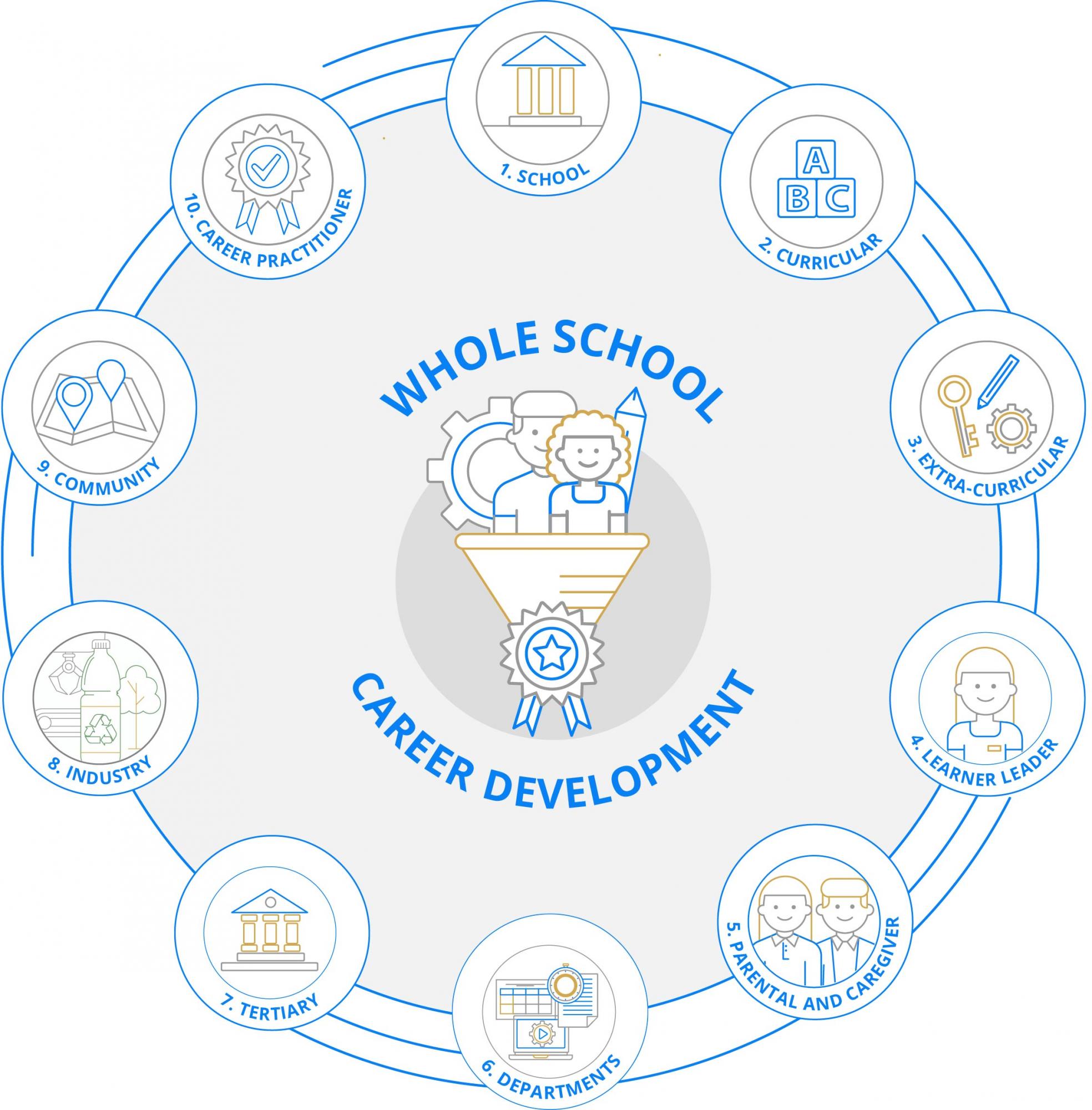
One mandate of SACDA is to professionalise the field of career development through the development of standards. The Whole School Careers Framework provides a structure on which to build standards. The Careers Advisory Panel will therefore focus on the potential of a whole school approach to career development which aims to leverage the entire system to support the career development of learners.
The framework has 10 components:
School support: Every school has a careers programme that is embraced and celebrated by the Senior Management Team, School Governing Body, teachers, and learners.
Curricular support: The curriculum is strengthened to ensure career education is infused in all grades and subjects. Further careers related support includes lesson plans and workbooks, together with co-curricular support such as posters and videos.
Extra-curricular support: Extra-curricular activities complement curriculum to enhance the career development of learners. These activities find expression through career clubs where learners help each other and work on careers and entrepreneurship related activities.
Learner leader support: Peer learning is a powerful mechanism to enhance the career development of learners. Learners who successfully navigate a key transition help other learners through the transition.
Parental and caregiver support: Parents and guardians play a significant role in the career decisions of learners. Activities that encourage career discussions between learners and their parents/guardians are coordinated to enhance parental involvement.
Departmental support: Several departments are situated around schools. These departments support the career development of learners through curricular, co-curricular, or extra-curricular activities such as career talks, open days, job shadows and volunteering.
Tertiary support: Colleges and universities support the career development of learners through school visits and open days. Further to introducing the programmes on offer, they assist learners in preparing for their programmes and in managing the social environment.
Industry support: Industry supports the career development of learners through school visits, site visits, job shadowing, and volunteering opportunities. Industry bodies such as SETAs and professional bodies also prepare learners for the transition into their sectors, and provide opportunities for access.
Community support: Communities have individuals and organisations that contribute to the wellbeing of the community. These entities visit schools to motivate learners and provide support.
Career practitioner support: Career development practitioners support schools in implementing a whole school careers programme and support the strengthening of each component.
COMPETENCIES OF CAREER DEVELOPMENT PRACTITIONERS
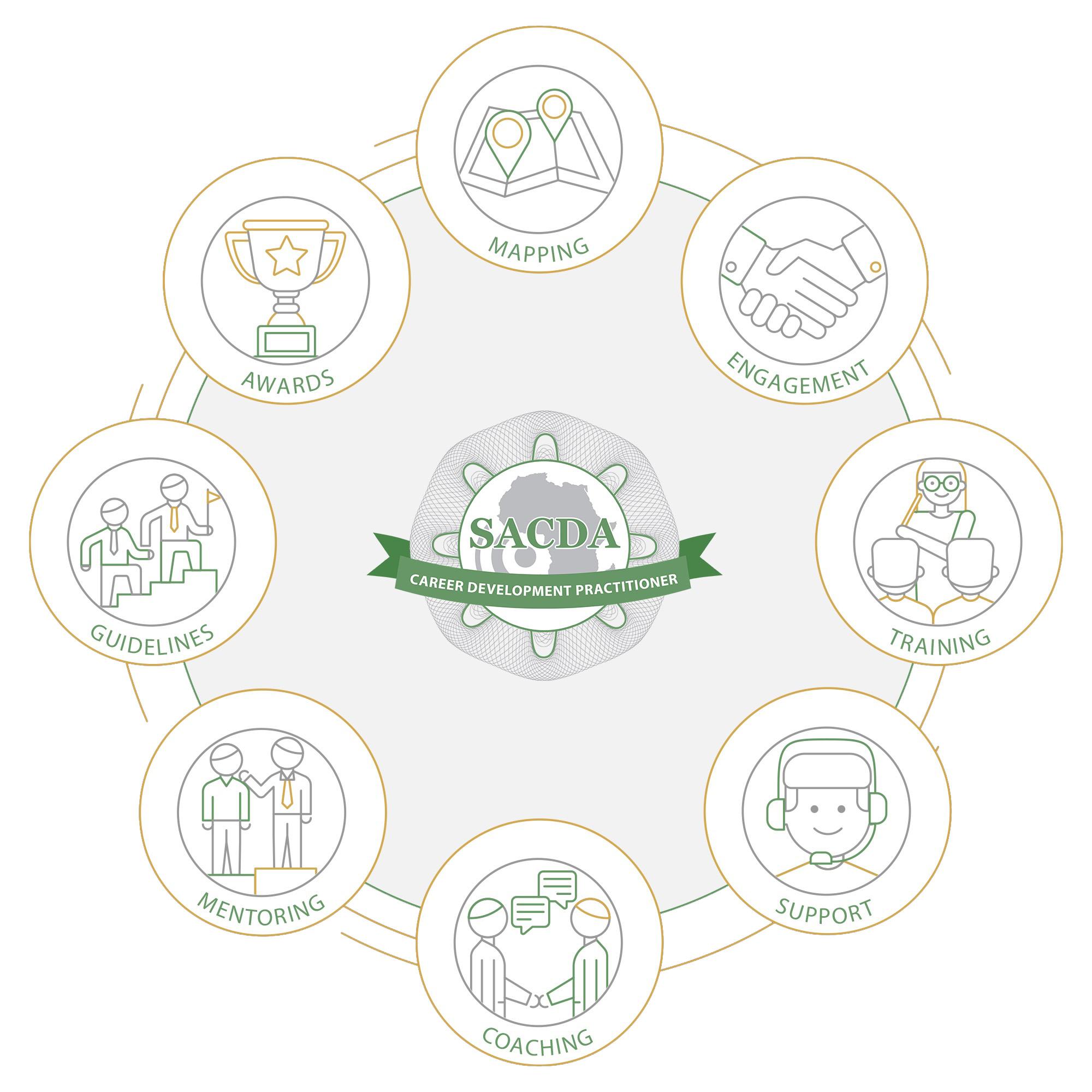
As per the literature review of the National Entrepreneurship Strategy, the development goals of South Africa can only be achieved through accelerated economic growth and job creation, driven by entrepreneurship and sustainable MSMEs. Research highlights, however, low levels of entrepreneurship and a high-failure rate among small enterprise, relative to South Africa’s peers. As entrepreneurship is a career path, career development practitioners can enhance their own competencies to support this option.
Competencies also include mapping of formal and informal employment opportunities to provide local labour market information needed for career decision making. Employer support from the informal and formal economy takes place through relationships. Career development practitioners in communities are well positioned to make contact and build relationships over the long-term should they be adequately resourced to do so. Standards for each of these functions are needed to ensure quality career development services for all.
AFRICAN JOURNAL OF CAREER DEVELOPMENT


The growth of the African Journal of Career Development (AJCD) is attributed to the Editor-in-Chief, Professor Kobus Maree. The AJCD is a peer-reviewed scholarly journal that provides a forum for the dissemination of cutting-edge research relating to career development predominantly in Africa (but also to career development elsewhere in the world).
The core aim of the AJCD is to facilitate the reporting of research related to promoting sustainable decent work for all. Here, decent work is regarded as a basic human right for all those who are willing and able to work. The challenge facing us as careers researchers, theorists and practitioners in the early part of the 21st century is how we can individually and collectively join hands to promote sustainable decent work for all.
VISION OF SACDA
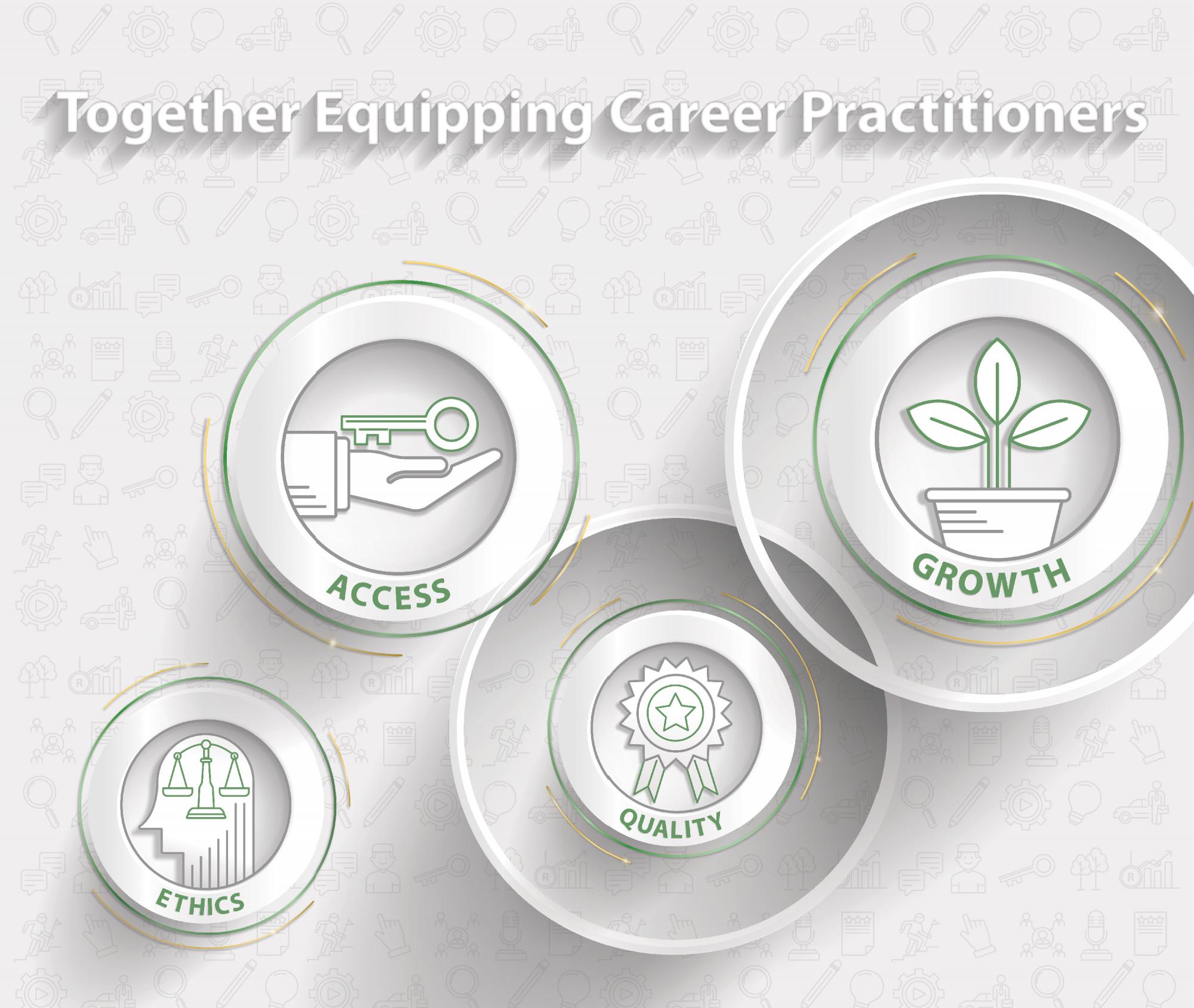
SACDA’s vision is to see career development practitioners in every school who are competent, confident and resourced to oversee career education in curricular and co-curricular activities, and career guidance through extra-curricular activities. To be supported by career development practitioners in communities who coordinate school clusters and ensure community coordination of career development services. This vision is supported by the national policy for an integrated career development system for South Africa which states that life skills and life orientation teachers could be expected to meet the requirements of a career development practitioner.
At the launch of the career development practitioner professional designation, the Deputy Minister from Higher Education and Training, Mr Buti Manamela stated that ‘career development practitioners are our soldiers. They are the first battalion that we’re releasing out there into the country to go and work with young people, to go and help with the career challenges that we have in our communities, where young people are essentially navigating the career spaces blind. Where the first time some of them are interacting with career information is at a university after having already applied. Career development practitioners must go out there and help contribute towards the success in terms of our basic education, higher education and skills development in our country. Enlighten young people about the multiple careers that are out there that are available but also advise them on what is obsolete. Drive their passion. You are there for that and I have so much hope that you will do our country good’.
UNIVERSITY CAREERS FORUM
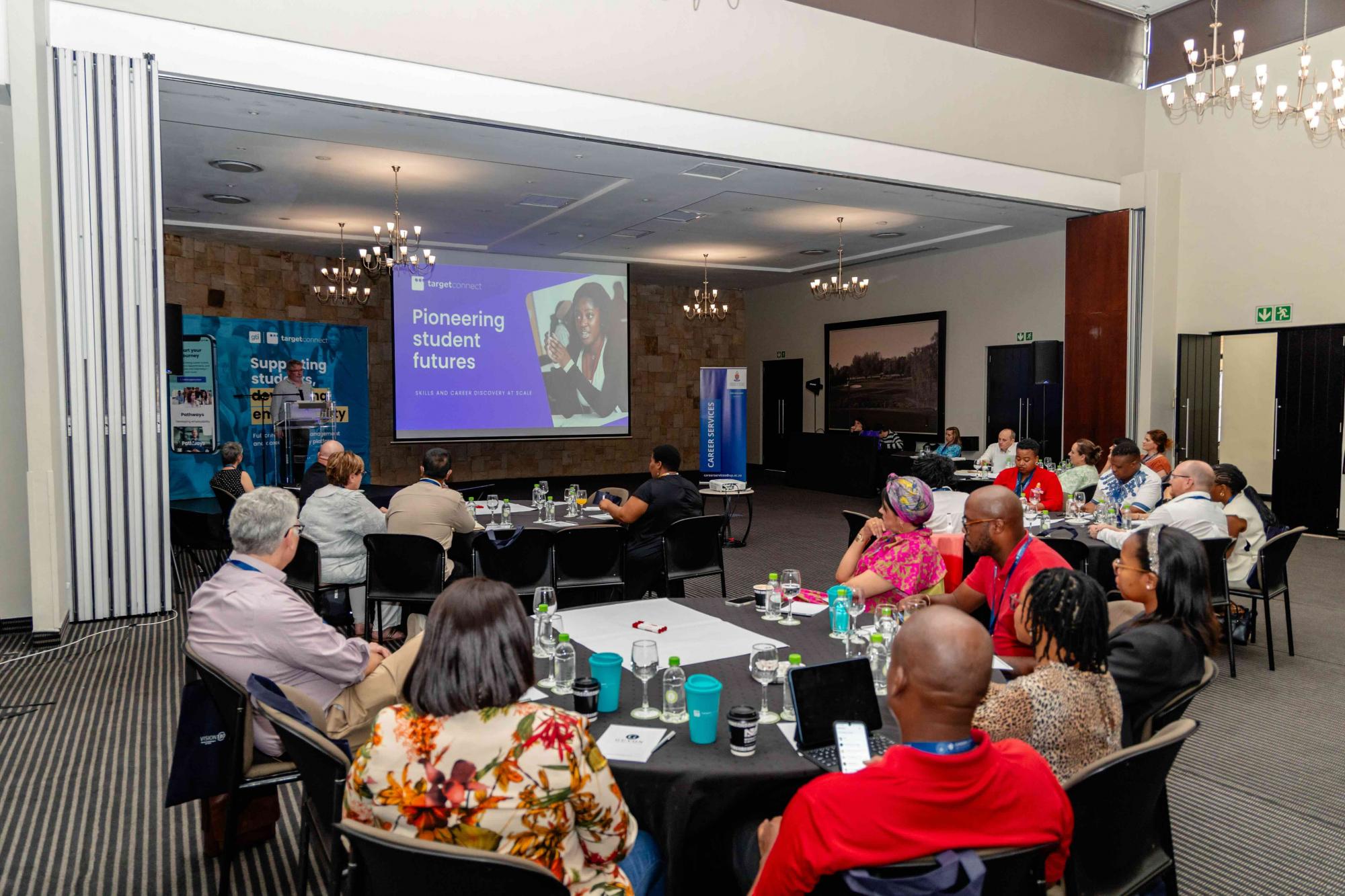
The University Careers Forum was hosted by SAGEA in person on 22 November 2024 for the first time since lock-down. The forum included robust discussions on the evolving services being provided by university career centre’s, which includes entrepreneurship. The recommendation for universities to promote the opportunity for students to go back to their schools during term 3 week 8 each year to motivate and discuss their challenges and opportunities was raised for consideration. Mechanisms to recognise students for giving back through this type of volunteering is the next step in ensuring university involvement in the NCW.

To get more involved in these matters, email info@sacda.org.za
You are also welcome to join us on this journey by following us on:
YouTube: www.youtube.com/@careerpractitioners
Threads: www.threads.net/@careerpractitioners
Instagram: www.instagram.com/careerpractitioners
Facebook: www.facebook.com/careerpractitioners

Latest News
- SACDA News 2025
- SACDA News 2024
- SACDA News 2023
- SACDA News 2022
- International Think Tank Webinar 2
- International Think Tank Webinar 1
- 2021 Career Development Conference
- Careers in Curriculum
- Growth through Sector Education
- Growth through NanoCPD
- SACDA News 2020
- Quality through Homegrown Interventions
- Access through a Community Approach
- Access through Professional Designation
- Professional Boundaries in Career Services
- Back to Basics
- Employer requirements and employability mindsets
- Farewell Thandeka Langa
- Inaugural Congress for Career Development Practitioners
- SACDA Privacy Policy
- SACDA News 2018
- Code of Ethics
